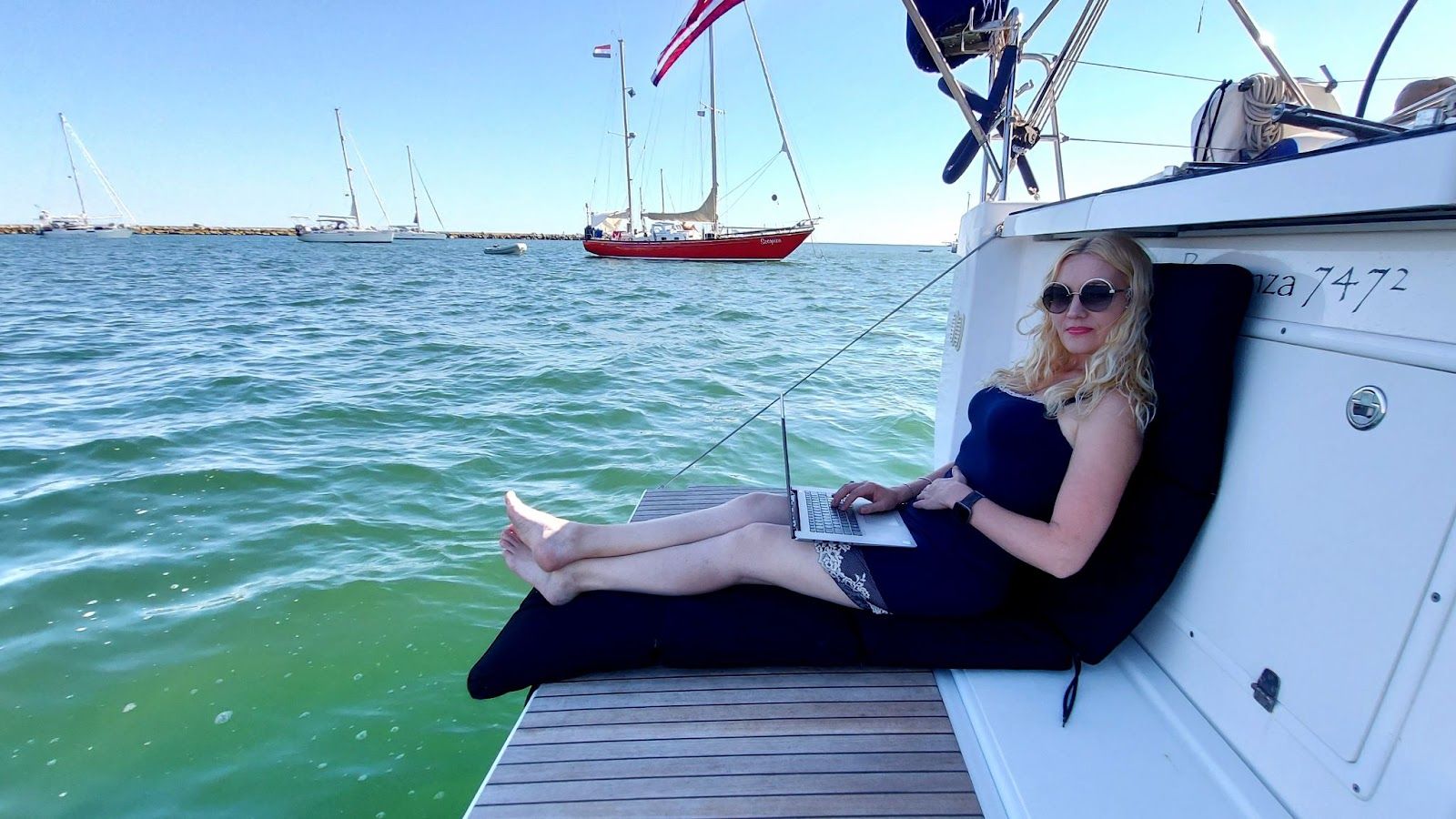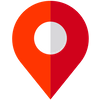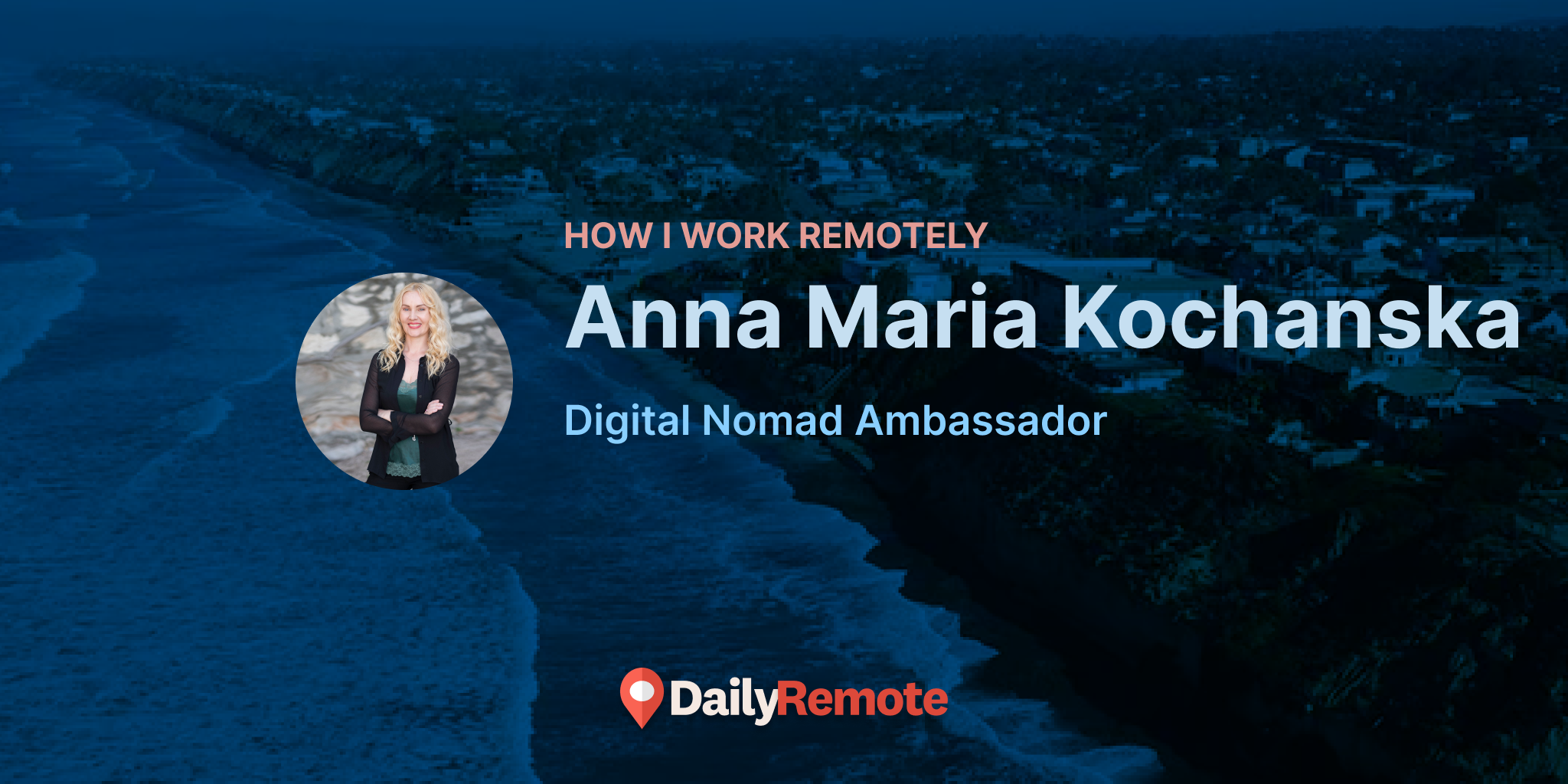Hey, I'm Anna Maria Kochanska. I became a digital nomad in 2017 and visited 40+ countries. Professionally work on digital transformation projects and consult on remote and cross-cultural skills. I am also a Digital Nomad Ambassador and Multilingual Keynote Speaker.
Additionally, I advise destinations and organizations on strategies to attract location-independent professionals and boost emerging nomad destinations. It was featured in various international media in Spain, Croatia, Cape Verde, Slovenia, Montenegro, and Bosnia and Herzegovina.
My goal is to promote a digital nomad lifestyle and highlight remote work's positive impact on local populations. I will be managing the Nomad X community in Cape Verde Remote Village this winter. It is a coliving project with volunteering in local NGOs and close connection with local communities.
Current Location?
Mindelo, Cape Verde (I follow the summer)
Where can we follow you?
Tell us a little bit about your background & how you got started with remote work?
I started working remotely long before Covid happened and was the first person in my company back then to do that. Initially, my job was announced as on site one, but I convinced the company I could do it remotely. They didn’t even have the contract for this case and had no idea how to go through it. It was an experiment that turned out well, and months later, they allowed a few other people to work remotely.
I see many people complain that new openings are not fully remote but underestimate their power and the fact that you can lead the change you want to see in the world. And if that was possible before the pandemic, imagine now.
Take us through your typical weekday?
Most of the time, I work at home, where I am most productive. This is very personal, though, and needs to be adjusted individually.
I work during the mornings; afternoons are for sports or exploring activities. Evenings are for social events with remote workers and locals.
Aside: Learn more tips on how to work from home like a boss.
What’s your workspace setup like?
I am a minimalist, and I mean it. You don’t need any fancy gadgets.
All you need is a good Internet connection, a suitable desk & comfortable chair, and a laptop. Natural light is essential for me; a good view is a plus.
What apps, gadgets, or tools can’t you live without?
Google maps 🙂 Everything else is replaceable.
How do you stay focused on your tasks?
Well, deadlines and commitments help ☺️
Seriously though, productivity comes from auto-awareness of how to organize our workspace so we can thrive. Again, this might mean different things to each person.
For example, I choose to work from home because people chatting in cafes or coworking spaces distract me. Yes, there are better settings than an open office for me, which is one of the reasons I wanted to work remotely.
I sometimes work from public places when I don’t have tasks that require full concentration.
How do you keep track of what you need to prioritise?
I make appointments for important tasks or events and set them in my calendar. They should be the first thing to do during my most productive hours.
How do you recharge or take a break?
Balance is the key.
You have to know how to set boundaries to finish work at a reasonable time and hit the gym or dance class. I also proactively join social and cultural events and organize myself to ensure all the areas of my life are well taken care of.
On weekends I often explore the country on full-day trips or spend time in nature.

Advice for someone who is looking to switch to a remote job?
This depends on the person's current situation and goals.If they have a job that they like but is not remote, I would convert it to remote first rather than leaving it. There is always time for leaving.
If they need to look for income, it makes sense to explore if they want to be freelancers and have their clients or be a full-time employee.
Getting some remote experience first is good, as many companies will ask for this. You can do it in your current job, volunteering projects, small side gigs, etc.
Finally, trust is a treasure in an era of remote work. Gather recommendations, have a portfolio, and build a personal brand even before you look for a job.
Aside: Learn the skills required to land a remote job
What working remotely really means to you?
Freedom, flexibility, and better work-life balance.
Since I work remotely, I have traveled the world, attended digital nomad conferences and dancing festivals, organized events with locals myself, and slept and ate better, saving time and energy due to no commute.
Remote work also allows us to connect with different cultures, positively impact local populations, and make the world a better place.
Aside: Learn why the future of work is remote.
How should one go about finding and getting a remote job?
Ideally, look for a job in remote first companies. They already have the right mindset and processes, making everything more accessible. But we cannot rely only on those companies as they are still a minority in the market.
You can also apply for not fully remote positions and see if the companies are open to negotiations. Again, be brave and take risks. Your power in negotiation will depend on your skills and experience and how much a company needs you.
Remote work is a competitive field, so many companies will opt for experienced and trusted professionals. Build a personal brand and the right network before looking for a job. Follow remote-first companies on social media and find role models.
Join remote workers and digital nomads communities, don’t reinvent the wheel. There are a lot of resources on how to start a location-independent lifestyle.
Aside: Learn how to find a remote job?
What qualities would you recommend are a must-have for a person seeking a remote job?
The most important ones are good communication skills, time management, organization, self-motivation, and flexibility. Cross-cultural competence is also something worth investing in nowadays.
What is the most challenging aspect of working from home?
This is a very personal question. It depends on many factors: do you live alone or with someone, your personality, job, budget, country infrastructure, etc.
Working at home is more accessible than at the office, but many people struggle with communication and collaboration with coworkers or clients, setting work boundaries, and feeling lonely.
What, according to you, are the pros and cons of remote work?
With bigger freedom comes bigger responsibility.
Everybody wants the freedom to travel the world, but many don’t realize that by doing it, you are becoming fully responsible for your productivity, health, and social life.
Since you left your in-office job and social systems, if you aren't happy, there is nobody to blame but you, and this is a heavy realization for many.
Want to work remotely like Anna? We recommend reviewing the list of top remote companies allowing permanent work from home.
Are searching for a remote job and are trying to figure out where to look. DailyRemote has latest remote jobs in various categories such as software development, marketing, virtual assistant jobs etc. Also, connect with like-minded remote job seekers in our LinkedIn remote community.

